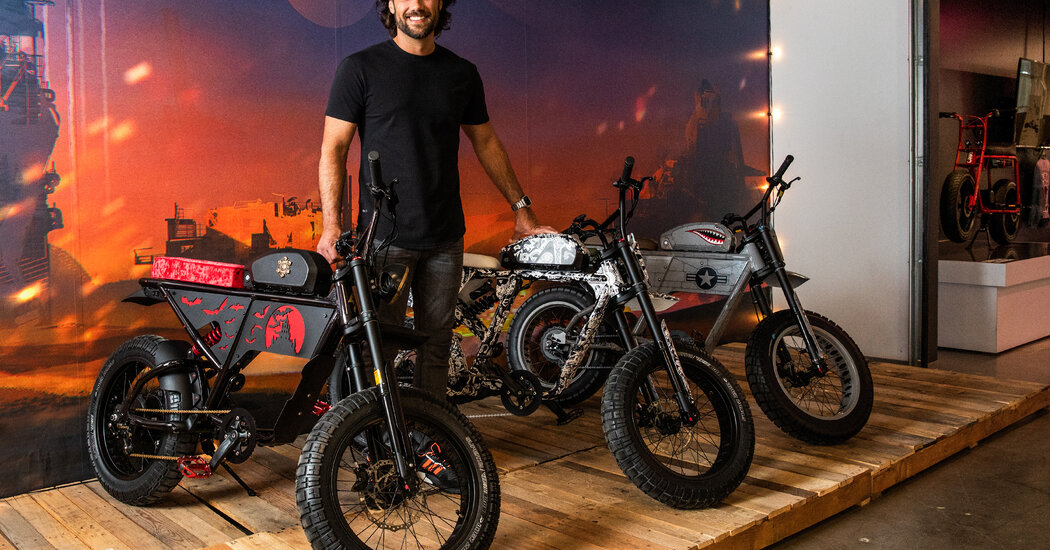
LeGrand Crewse, co-founder and chief executive of Super73, recently showed off the company’s latest product, a diminutive motorized bike called the K1D. Aimed at riders 4 years old and up, the vehicle lacks pedals, in the spirit of a training bicycle, and has a throttle. The company calls the K1D an “electric balance bike.”
“But you can also call it a motorcycle,” Mr. Crewse said during a tour of the company’s 60,000-square-foot headquarters. In “normal mode” the K1D can go 13 miles per hour. “Then we have a race mode,” Mr. Crewse said — at 15 miles per hour.
The e-bike industry is already pushing the boundaries of youth transportation, and Super73 is an early darling among customers. The company aims to sell more than 25,000 units this year, a significant portion of them for teens, Mr. Crewse said. Unlike the K1D, most Super73 e-bikes come with pedals as well as a throttle-powered electric motor. What the company is selling, Mr. Crewse said, is a lifestyle, featuring “cool” products that are not subject to heavy regulation.
“Ride without restrictions,” the Super73 website declares, in bold letters. “No license, registration, or insurance required.”
Mr. Crewse added: “Actually no helmet requirement even, except for one class of bikes — and even then, specifically around younger age riders.”
State and federal laws essentially treat e-bikes as traditional bicycles so long as they don’t exceed speed limitations — although many e-bikes can easily be altered to do so. This laissez-faire oversight, Mr. Crewse said, “dovetails perfectly” with the ethos of the younger generation.
“If you think of Gen Z and millennials, if they can’t have instant gratification, they want nothing to do with it,” he said. “They’re not interested in taking time to learn something: ‘I’m not going to get my motorcycle license, I don’t want to go through this course that takes X-amount of hours — it’s too much of a hassle.’”
But law-enforcement officials and some safety experts worry that many e-bikes are dangerously unlike traditional bicycles: too fast for sidewalks and not built for the complexity and speed of roads. Some retailers decline to carry Super73 e-bikes or others like them, contending that they tempt young riders, untrained in road safety, to think they are safe mingling with high-speed auto traffic. Several children in their teens have died recently in e-bike accidents. Some e-bikes can travel at speeds that may qualify them as motor vehicles, but federal regulation has not kept up.
“There is pressure from the market to sell novel and interesting things that are faster and more fun,” said Christopher Cherry, a civil engineer at the University of Tennessee, Knoxville, who studies e-bike safety.
Mr. Crewse entered the nascent e-bike industry more than a decade ago, when he began tinkering with ways to add motors to bicycles. In 2012 he toured China as a wide-eyed entrepreneur. “I booked a trip with no plans,” he recalled. “In that two-week period, I wound up meeting a whole bunch of people, went to a whole bunch of factories — relationships I still have today.”
In 2016 he co-founded Super73 with Michael Cannavo and Aaron Wong, with the aim of selling more stylish e-bikes that were not “for the geriatric crowd,” Mr. Crewse said; the typical Super73 model resembles a dirt bike or a minimotorcycle with pedals. “I read somewhere that something like 98 percent of people think they’ll look cool on a motorcycle,” he said. “We bring moto-heritage with youth culture.”
Many retailers initially would not carry the company’s first mass-produced Super73, introduced in 2017. “‘This is not a bike, this is not a bicycle,’” Mr. Crewse recalled being told by retailers. “We got laughed out of every place.”
PeopleForBikes, the trade group that represents traditional biking companies and e-bike manufacturers, has taken issue with Super73 and other manufacturers that sell products that can be reprogrammed to effectively become motor vehicles and not e-bikes at all.
Most of Super73’s models offer a re-programmable option, including the Z-Miami, which is small, comes in pink and, Mr. Crewse said, is “popular with younger riders.” Parental controls were not possible on existing models, he said, because of “a limitation of the current software.” He added, “That will absolutely happen in future software releases.”
He floated the prospect of e-bike training for young riders. “The motorcycle training program I took has literally saved my life,” he said. But he noted that requiring e-bike training could harm an industry that he credited with creating more sustainable transportation. “The question is, how much do we want to force,” he said.
A father of five, Mr. Crewse advised parents who buy an e-bike to invest in a high-quality helmet and other safety equipment. “The biggest thing is understanding the risk of a vehicle going 20 miles per hour,” he said. “There are consequences. Things can go wrong.”













